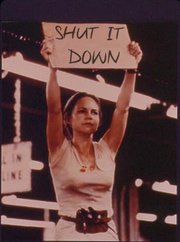Reading liberal blogs these days I frequently get a sense of rage and impotence. (The still is from the 1979 motion picture Norma Rae.)
- Stories about the Emperor Dick seem to be ignored, or edited so as to appear benign, while instead they jump up-and-down condemning John Edwards’ charity.
- Hating Michael Moore has become the new national obsession.
- The odds in radio are totally stacked against us, and even when right-wing hacks get no rating, they stay on the air.
- All the foolishness which led to the Great Depression has been put back in place, and no one seems to care. In fact, all policy begins to look like a bridge to the 19th century.
- Exclusives which highlight the systematic, banal evil of our actions are systematically ignored.
- Neither Democrats in Congress nor those running for President seem to catch the people’s urgency to get out of Iraq.
At the risk of repeating my theme here, let me say this again. George W. Bush and Dick Cheney aren’t evil by design. Neither is Bush stupid. They are idealists, only their ideology has become obsolete, a point obvious to everyone except the people in power.
- The New Deal was obsolete when Lyndon Johnson was
facing the nightmares of riots and Vietnam a generation ago. He was
neither stupid nor evil. He just lacked the tools to cope. - The Progressive Thesis was obsolete when Herbert Hoover was facing the nightmares of the Great Depression. He was neither stupid nor evil. He just lacked the tools to cope.
- The Civil War Thesis was obsolete when Grover Cleveland was facing the nightmares of industrial strife and economic collapse in the mid-1890s. He was neither stupid nor evil. He just lacked the tools to cope.
- The Jacksonian Thesis of regional balance was obsolete when James Buchanan faced the nightmare of Civil War in the late 1850s. He was neither stupid nor evil. He just lacked the tools to cope.
What liberal bloggers should be on about is creating the tools to cope.
Whether you call it myths and values, or a political thesis, or an ideology,
the assumptions men bring to America’s Presidency are their chief
weapon. We, the People depend on these generational ideologies to lead
our thinking on political subjects, so blaming an individual, or a small group, for failing to rise above their own time to me seems silly.
Every generation goes through the same process. There’s a crisis,
there’s a new political thesis which responds to that crisis, the
thesis is validated by events, an anti-thesis comes to power which
leans against the thesis, then new problems arise which neither the
thesis nor anti-thesis are equipped to handle.
The proper role of a political opposition, in a time of crisis, is
to come up with new myths, and new values, which address the real
problems of their time, and to apply this thesis to those problems so
that when power comes, hope returns. The New Right did this a
generation ago. The Netroots are doing this in our time.
But it’s a hard slog, because Washington, by the nature of the
place, is completely wrapped up in the now. Its assumptions about now are
always, always based on the dominant political thesis, or its
anti-thesis. There is no ability, within the halls of power — and the
dominant media is as much a hall of power as the White House — to
stand above history, to see the patterns, and thus to speak historical
truth to temporary power.
This is only possible from outside. There are many things which need
to be done. Organization. Advocacy. Education. The development of the
new thesis. The application of that thesis to the current crisis, and
to other problems as well.
Whining is not on that list. Whinging is not on that list. Feeling sorry for yourself is not on that list.
The task of generational change is made more difficult by the fact
that obvious problems are not the true
crisis.
- Abraham Lincoln believed before taking power that the
crisis of his time was the extension of slavery in the territories. In
fact it was the Union, and the question of whether America would be an
agrarian or industrial society. - Theodore Roosevelt believed before taking power that the
crisis of his time was America’s power and role in the world. In fact
it was industrialization, and whether the people would have a voice in
that process. - Franklin Roosevelt believed before taking power that the
crisis of his time was the economy. In fact it was whether capitalism
and democracy would survive at all. - Richard Nixon believed before taking power that Vietnam was
the crisis of his time. In fact it was the unity of the society, and
the culture, which were at risk.
Today people think it’s Iraq that is the crisis of our time. It is
not. It is the fate of the planet itself, whether our grandchildren
will have an ecosystem to protect, or a dwindling water hole to fight
over. The crisis today is a choice between the dystopia we’re heading
toward and the utopia we thought we were creating.
The best evidence for this truth is to be found in the realm of
science fiction. Notice how over the last decades positive views of the
distant future have disappeared from the shelves, at how science itself
seems to have been banished in favor of pure fantasy.
All of us in this online world need to be searching for ways out of
our real crisis, on building myths and values which will point future
leaders in the right direction. We have a medium in which to do this.
This revolution will not be televised.
So stop whining, stop feeling impotent, stop reacting, and get on with it.














